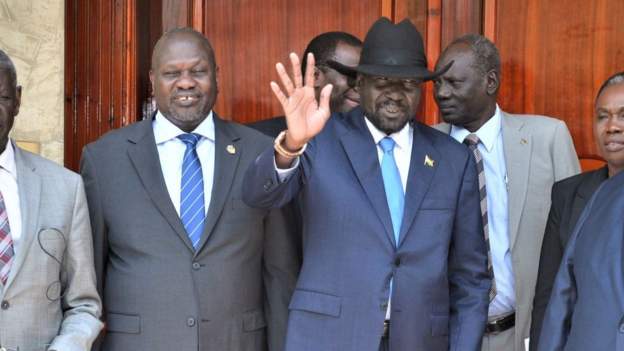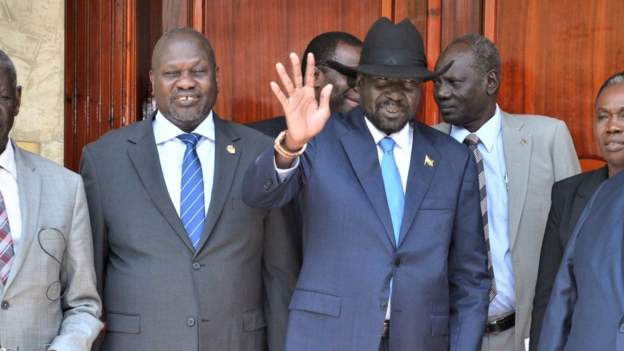South Sudan’s unity government extended by another two years

– –
South Sudan’s unity government has been extended by two years as part of a new “roadmap” towards peace.
Government Affairs Minister Martin Elia Lomuro told diplomats on Thursday that the country’s President Salva Kiir and First Vice President Riek Machar support this new move.
“After lengthy deliberations, the committee agreed to extend the transition period by 24 months,” Lomuro said.
According to him “a new roadmap has been agreed to address the challenges that are hampering the implementation of the peace agreement.”
The current two year transition period was scheduled to end in 2022 after several postponements, but was pushed back to February 2023.
– –
Representatives of the US, UK and Norway, the “troika” that sponsored the country’s independence in 2011, boycotted the meeting at which the extension was announced.
They wrote in a letter to President Salva Kiir, that they deplored the fact that all parties concerned were not consulted.
“We are writing to you personally to express our deep concern that inclusive consultations must take place with civil society, religious groups, economic actors, women’s groups, youth representatives, eminent persons and international partners before the R-ARCSS is amended,” they wrote.
“Whether a roadmap or an extension is considered legitimate by the people of South Sudan and the international community depends on an inclusive consultation process,” they added.
– –
They warned that they “cannot guarantee that we will be able to support a roadmap or an extension in other circumstances. The roadmap must demonstrate how a new extension differs from previous ones and includes steps for clear progress in building the institutions and mechanisms needed to hold elections.”
Two years ago South Sudan’s rival political factions signed a peace deal that ushered in a unity government that was supposed to restore peace to the country.
Former rebel leader of South Sudan Riek Machar and three other persons were sworn in as vice presidents.
The formation of a unity government was seen as a major move that could definitively end years of fighting in the country.
Per the deal former Vice-President Machar returned to his former position after he was sacked by President Kiir.
The East African body, Igad, this year said that the peace deal signed in 2020 was facing challenges, including unresolved issues on the writing of a new constitution and preparations for fresh elections.
“Igad as a region cannot be at peace when South Sudan is shedding blood. I would really like to appeal to the international community to stand with the people of South Sudan in supporting the peace process,” Igad Special Envoy for South Sudan Ismail Wais told diplomats in the capital, Juba in February.
President Salva Kiir has said he won’t contest upcoming election which would be held without conducting a census, something his former rival, Riek Machar, has opposed.
There are also concerns from Mr. Machar about conducting elections without a unified national army being formed, a new constitution written, census conducted and millions of refugees in neighbouring countries allowed to return home to vote.
In April this year a unified armed forces command was formed with the integration of opposition commanders into the structure of the armed forces.
Per the new structure, the president’s faction has a 60% representation while the opposition occupies the remaining 40%.
The most recent deal was signed in 2015 but it did not help to end the conflict. South Sudan gained independence in 2011 from north Sudan but fighting broke out two years later.
Source: Africafeeds.com




